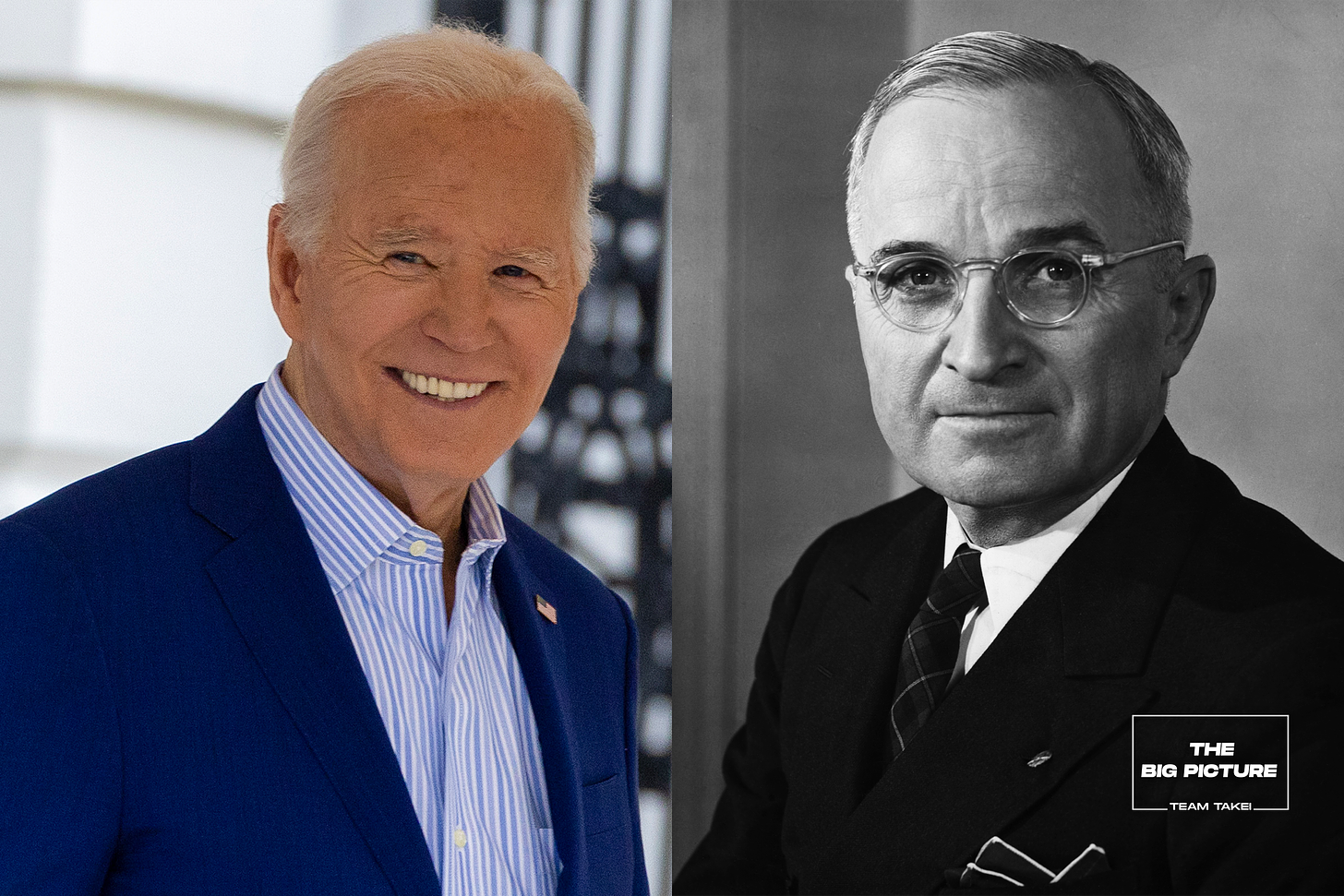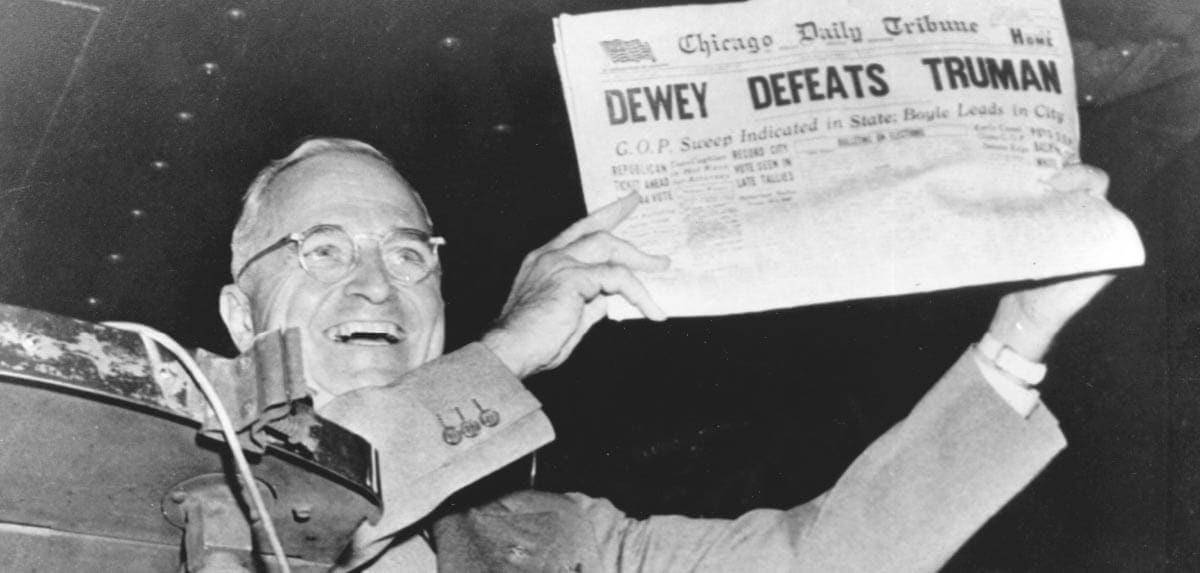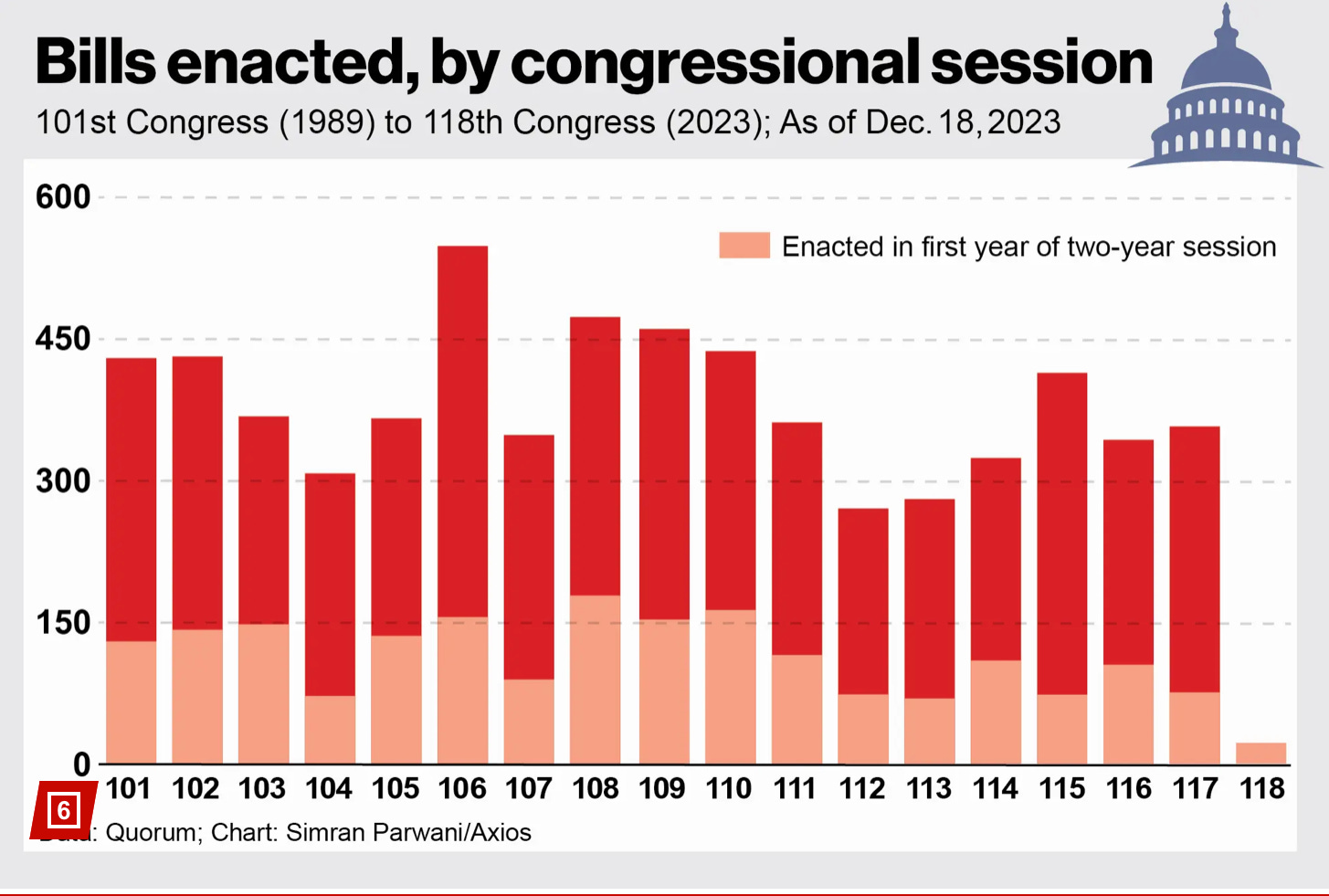1948 Felt A Lot Like 2024–And That’s Good News For Biden
The parallels between 2024 and 1948, when Harry Truman came back to win a second term amid a troubling economy, bode well for Joe Biden.

By all accounts, the economy looks great. At least on paper it does. Growth is strong, unemployment is low, wages are rising, and the stock market is setting records. And yet most Americans rate the economy as poor, and the sour mood is dragging down Biden’s approval numbers. And that in turn has implications for the election in November.
It’s fair then to ask, have we ever seen anything like this before?
Back before there was a Consumer Confidence Index, America experienced a period of deep economic dissatisfaction and gloominess that bears a striking resemblance to what we’re seeing today. The year was 1948, and Harry Truman was president. But, the general consensus was that he probably wouldn’t be for much longer.
The post-war economy had suffered some bad jolts. At its peak, just the year before in 1947, inflation reached a staggering 20 percent. And Truman, who had enjoyed a 90 percent approval rating at the end of the war, had become extremely unpopular, with only 36 percent of the populace approving of his job performance by January of 1948. Sound familiar? All the polls and pundits said he was going to lose.
Only he didn’t. In one of the most storied political comebacks in history, Truman went from being considered down-and-out and in-over-his-head by nearly all observers, to handily beating his Republican opponent, Thomas E. Dewey, 303 electoral college votes to 189. This was so contrary to expectations that the papers had even pre-printed his loss to Dewey with an infamous “Dewey Defeats Truman” headline—which Truman held up as a big middle finger to the political and media establishment.
Nate Cohn, the chief political analyst for the New York Times, was the first to examine and write about the parallels between that other election year—1948–and now. He recently further explained his research during an excellent interview with The Daily, the Times’s popular podcast.
In this piece, I will highlight Cohn’s main points about the economic and other parallels between 1948 and 2024. I will also expand on Cohn’s analysis in light of recent events, specifically the GOP’s pivot to immigration as its political weapon of choice, even as it sinks any effort to actually pass legislation to address the border crisis it claims is ruining America.
It turns out that 1948 may not only be a useful historical comparison for the Biden campaign, it may also provide something of a roadmap for success.
The inflation monster isn’t so easy to tame
The years 1948 and 2024 share one strong theme in common: both election years followed a severe shock to the system.
In 1948, it was the post-World War II era. Today, we often remember those years as boom times for the economy, with America ascendant and Europe rebuilding, right before the big “American dream” decade of the 1950s. But this overlooks the immediate aftermath of World War II, which was actually a chaotic time for the economy.
In that period, the government lifted wartime price controls and rationing, and demand soared. That sent the price of ordinary goods and services skyrocketing. By the end of 1947, food prices had risen 46 percent over a year and a half earlier, according to the St. Louis Federal Reserve Report. Clothing was up some 19 percent, per news reports at the time. On top of that, GIs returned home by the millions, making housing scarce and driving rents and asking prices higher.
In 2024, we are still in the post-Covid and active Ukraine war era. Supply chain disruptions drove costs higher, while Russia’s invasion of Ukraine in 2022 caused oil and food prices to soar worldwide. Corporations hiked their prices, too, not just because their costs were higher but also to take advantage of an inflationary surge and to rake in record profits. As millions who had fled major urban areas returned, rents rose rapidly and have only started to come back down.
During both of these years, in stark contrast to the inflation Americans experienced, the baseline economic numbers looked decent, with high growth and low unemployment. But the deep uncertainty that inflation caused took time to overcome. In 1948, according to Cohn’s reporting, 70 percent of Americans polled would rather have seen their own wages reduced if it meant prices could come down. That’s how big an impact inflation was having.
Few would have predicted the boom times of the 1950s to come. Back then, in early 1948, inflation was still running at 10 percent annually, and no amount of broad and improving economic indicators could convince inflation-weary U.S. citizens that the economy was actually doing fine. Many Americans, who remembered the hard times of the early 30s, actually believed that another depression was on its way, when just the opposite was true.
But by mid-1948, inflation had fallen in half. And importantly, most Americans believed that prices were not going to continue rising as fast. And that translated into better prospects for Truman’s reelection.
In some ways, President Biden has it a bit easier than Truman did. Inflation has already come down from its high of 9 percent in July of 2022 to more or less normal levels now. And consumers are already beginning to respond. The Consumer Confidence Index leapt upward in December of 2023, and then again in January of 2024, for a cumulative total of 29 percent. The reading included sentiment improvements across all age groups, income groups and educational levels. And it’s the highest reading since the summer of 2021–when Biden’s approval numbers were above 50 percent.
The number of Americans who wrongly believe we are in a recession has fallen too, down from around 60 percent in April of 2023 to around 41 percent in 2024. That’s still a pretty high number of negative vibes, but the trend is unmistakable:
When Truman was running, he needed to shift the narrative on inflation, which was a political albatross weighing down his campaign. So he took his case directly to the American people. He sought to pin the blame for inflation on his opponents by labeling them the “do nothing” Congress.
That steady messaging got through, right as inflation came back down from the stratosphere. And Truman came back to win the election, to the shock of nearly all observers.
Could Biden enjoy the same political trajectory?
Once again, a do-nothing Congress
Cohn suggests that Biden won’t be able to “pull a Truman” and successfully shift the economic blame to his political opponents. But then again. he might not have to. The way things are going, Republicans and Trump already understand that they need to find something else to attack Biden on, because the economy is likely going to help Biden in the end, not hurt him.
We are already at the point where Trump is claiming that the markets are hitting record highs not because Biden is doing a good job shepherding the economy, but because polls show Trump is likely to win the election. In other words, he makes the remarkable claim that the markets are simply anticipating his return.
“THIS IS THE TRUMP STOCK MARKET BECAUSE MY POLLS AGAINST BIDEN ARE SO GOOD THAT INVESTORS ARE PROJECTING THAT I WILL WIN, AND THAT WILL DRIVE THE MARKET UP,” Trump wrote in an all-caps screed on Truth Social.
This is, to put it charitably, a stretch, and it is unlikely to persuade all-important middle of the road voters. Generally speaking, the person who gets the credit or the blame for the economy is the one who is in charge in the White House. Certainly, if the markets were to tank tomorrow, Trump would turn around and blame Biden for it.
Because the economy is not going to be as big a stinker as they’d hoped, in 2024 Trump and the Republicans have landed upon immigration and the border as the topics of choice and where they see Biden as most weak and vulnerable. Perhaps that is precisely why Biden was willing to concede to draconian GOP demands on border security and limiting asylum claims. This would, after all, blunt the GOP’s biggest political talking points for November.
Trump understands this well. It’s why he ordered Republicans not to pass the very bill they had spent months negotiating and which they had finally achieved through bipartisan compromise. But this opens an opportunity for Biden to campaign, as Truman did, on the “do nothing GOP,” which in this case decided to do nothing on the issue they claim was a crisis.
But the “do nothing” label goes far beyond the border issue and migration. In Republican hands, this is also the least productive House congressional session in a generation:
The GOP House majority instead has been marked by dysfunction and disarray. After spending the first part of this legislative session trying to elect a new speaker, and only succeeding after 15 attempts, they removed that same speaker months later for the crime of compromising with the Democrats and not destroying the good credit of the U.S.
And after several failed rounds, marked by highly publicized threats of violence and death from extremists in the MAGA camp, they elected a new but inexperienced Speaker, Mike Johnson, who apparently cannot count well enough to not bring bills to the floor that will fail.
The Biden Campaign will not have to hunt very far for material for its ads about the do-nothing 118th GOP-led Congress. Much of it comes courtesy of far-right radical Rep. Chip Roy (R-TX), a member of the so-called “Freedom Caucus.” Said Roy on the House floor recently,
For the life of me, I do not understand how you can go to the trouble of campaigning, raising money, going to events, talking to people, coming to this town as a member of a party who allegedly stands for something…and then do nothing about it. One thing: I want my Republican colleagues to give me one thing—one—that I can go campaign on and say we did. One!
He then dared any Republicans to come to the floor and “explain to me one material, meaningful, significant thing the Republican majority has done.”
Headline: Biden Defeats Trump!
In 1948, the New Republic was calling on Truman to bow out of the race, claiming it could not be won by him. There have been similar premature calls for Biden to do the same in 2024. But if history is any measure, and should 1948 repeat or even rhyme with 2024, Biden has cause for some optimism. Inflation is ebbing, and he’s facing a weak and splintered do-nothing GOP-led House.
There are many ways, of course, that 2024 is not 1948. As Cohn points out, presidential approval ratings have long since decoupled from how the economy is faring. There are yawning partisan gaps in perception, made worse by siloed information and deliberate misinformation. And in 1948, the nation of Israel was fighting for its very survival, and was not widely perceived as an oppressor state by the American left.
That said, Truman’s opponent Dewey had little to none of the political baggage that Trump carries. And ultimately voters will be choosing among candidates to indicate their preference, not asked whether any one candidate has earned their vote.
Moreover, Biden already had a very good night with the Midterm elections in November of 2022, not because he was terribly popular, but because voters were angry about Republican overreach on abortion restrictions in the wake of the Dobbs decision, and the alternatives to the Democrats were unacceptable MAGA extremists. Even with inflation still at near record highs in late 2022, the “red wave” never materialized as expected because voters rejected the most Trumpy candidates.
If, like Truman, Biden can enjoy good economic winds at his back during this election year, that will help him with a sizable segment of voters who care primarily about kitchen table, economic issues. Notably, the loss of the support of these voters for Biden coincided with shocks to the economy and high inflation. It stands to reason that a steadily improving economy can win a substantial number of them back.
And if Biden can successfully pin the label of “do nothing” on this Congress, which shouldn’t be hard given their abysmal record and their own colorful accounts of it, then, like Truman, Biden could also defy the polls and the political punditry come November.







I SO want to believe we have something good ahead.
Trump could be partially right about stock market maybe it's so good because the world I anticipating his impending incarceration and an end to his insane ramblings.